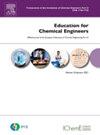The digitalisation megatrend is currently changing the way whole sectors of the economy are operated and in the manufacturing sector, digitalisation promises productivity improvements with seemingly marginal investments in “steel and concrete”. These sector wide shifts will inevitably influence how a chemical engineering graduate would perform their job functions, irrespective if they are working in an area such as petrochemical manufacturing or in the financial and management sector of the economy. This manuscript presents the results from three targeted surveys carried out to get a better understanding of (1) what alumni from a chemical and materials engineering degree think these changes will mean for them, (2) expert opinions on the level of detail key topics of digital twins, big data and Internet of Things (IOT) should be covered by an undergraduate chemical engineering curriculum and (3) what staff from a chemical and materials engineering degree think the best way to embed these concepts into an undergraduate level chemical engineering education. Analysing the results from the survey highlighted the following aspects. (1) An overwhelming number of alumni reported that elements of digitalisation are already influencing their industry and job function and these influences are likely to get stronger overtime (2) The experts identified that chemical engineering graduates will likely drive the development of digital twins hence requiring a high level of understanding in this subject. The graduates would only need to apply Big Data analytics and likely not be involved with the IOT developments. (3) The staff identified that these requirements identified by the experts can be satisfied by taking a two-pronged approach of adding modules to current core courses while developing standalone elective courses to cover the more advanced concepts.


